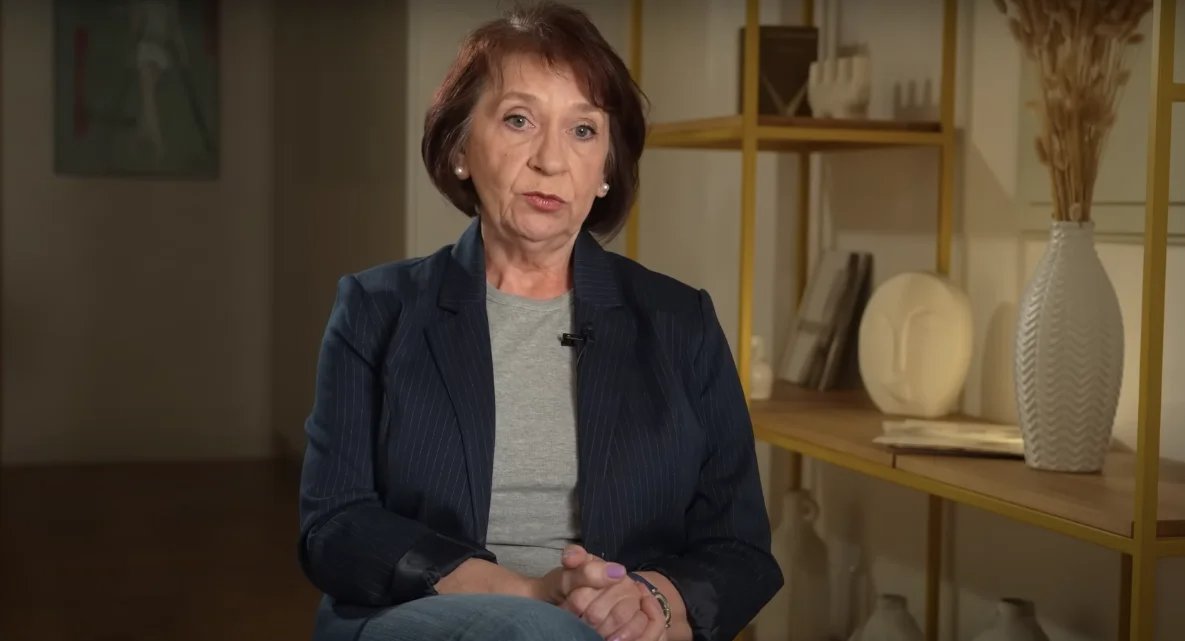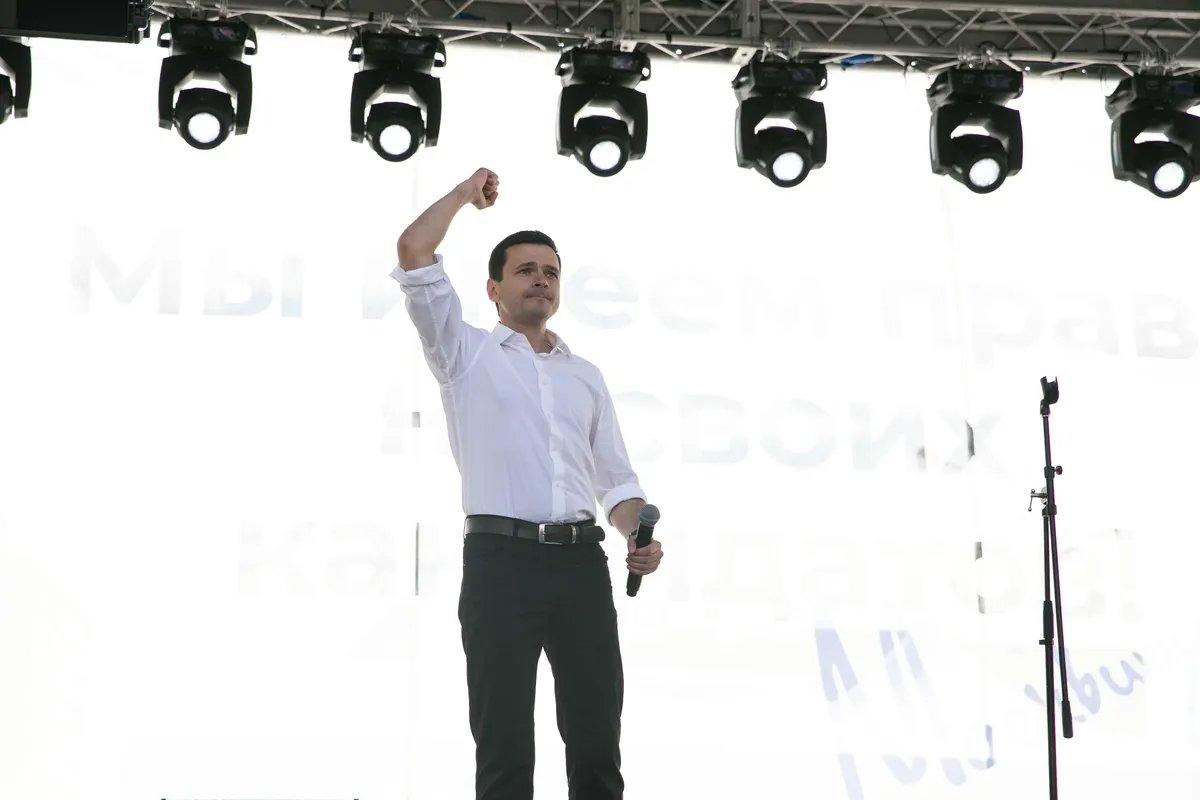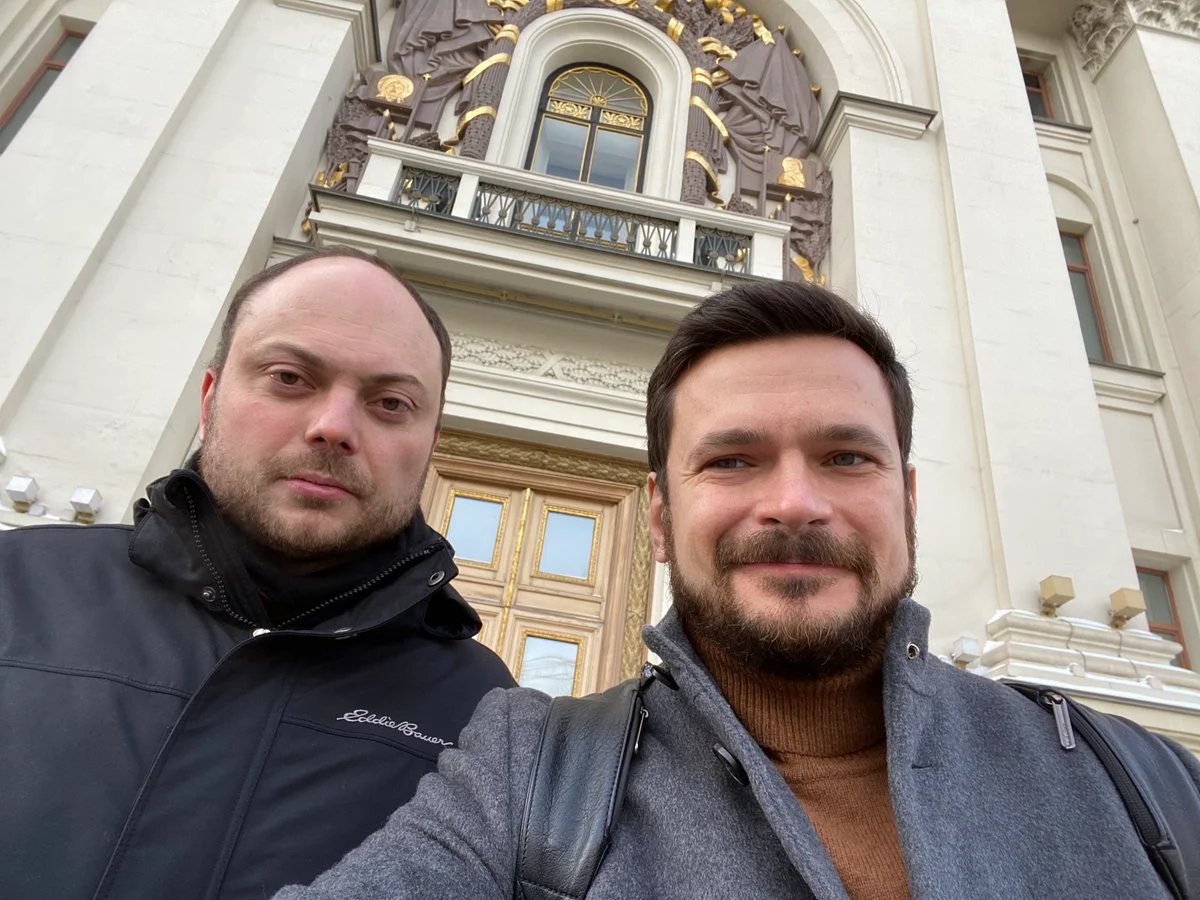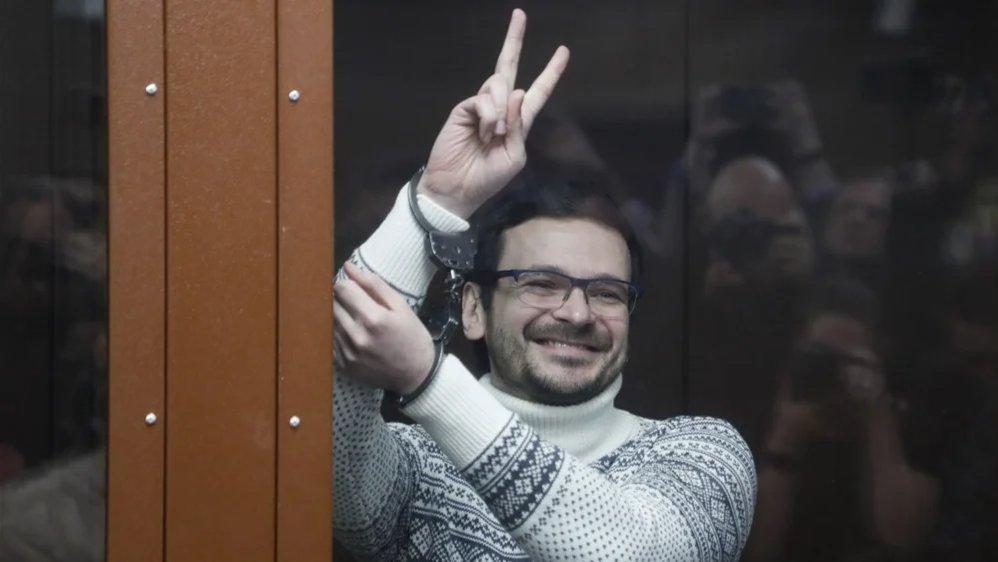Ilya Yashin, an independent politician and blogger, was arrested by the Russian authorities and accused of spreading “fake news about the Russian military” one year ago. He was later sentenced to 8.5 years in prison, found guilty of informing his YouTube subscribers of the Bucha massacre. Yashin turned 40 on 29 June 2023. The first anniversary of his arrest was the same day as his birthday.
Mira Livadina and Kirill Martynov spoke to Ilya Yashin about his prison experience, regrets, and hope.
Ilya, you often post things on your social media via your lawyers, telling your followers about the people you meet in police vans, courts, and pre-trial jail cells. They are very different: those who are in prison for household crimes, businessmen like the Magomedov brothers, and those who were convicted for drugs. Would you round it up for our readers: who are these people, what are their values and role models, and who produced the greatest impression upon you? How did they treat you, a political prisoner?
I’m afraid I might sound too banal, but the Russian prison is a perfect illustration of our society. You may meet any kind of person here, of any social status and income class. Prison puts together people who would never be next to each other on the outside, and they get along more or less peacefully. For instance, when I was in court, I had to beguile my time alongside people from the Forbes billionaires list and a guy who was detained for pilfering at a railway station. We would drink tea, using the water from the same kettle, and discuss the news coming from the frontlines in Ukraine: that was the topic all of us cared about. In the police van, I met a Penitentiary Service general who was taken in for bribery, and Chechen guys with beards, accused of robbery. They would passionately exchange opinions with each other, discussing what regions have the best prisons and where they would like to end up after the trial is over. A few weeks ago, a new guy became my new cellmate: a serviceman, he was in Svatove in Ukraine in February, and now he is suspected of arms trafficking. You might think there would be a confrontation between us as I publicly speak up against the war, and he just arrived from there. But actually, it’s all peaceful between us. We talked a lot and discussed things, and he even agreed with some of my points.
Prison puts very different people together, people with different backgrounds. But it also teaches you how to get along with the people who have views and values that oppose yours.
If you’re forced to spend months in a closed room with someone, both of you will need to get used to each other, follow the basic rules of coexistence, learn how to come to agreements, and share things with each other. It requires you to moderate your ambitions and be more tolerant. It doesn’t matter if you are in for something headline-making and political or for a routine crime. What is important is how you act, what your day-to-day prison life is like.
What things from the outside fade away and turn out to be insignificant or meaningless?
Routine confrontations, some small grievances from the past lose their meaning, of course. A few people I’ve not spoken to for many years due to some trivial quarrels sent me letters to the prison. Well, this happens... When you’re in confrontation with someone, certain tensions appear fundamental and ultimate, but as the time passes, you can’t even remember the reason behind the conflict, while the person has already vanished from your life. And now that I am behind the bars, I receive letters from friends I used to have long ago. These people have left the grievances of the past behind: they are sincerely concerned about me and wish to support me. I appreciate it.
What do your parents say when they’re allowed to visit? How do they bear the whole thing?
My parents are holding up so well, I am so proud of them. Obviously, they realised I might be arrested, and we discussed it many times. I tried to prepare them for this scenario. They faced law enforcement, too, as they had their home searched because of my case. They’ve been to all Moscow’s jails as they visited me every time I was put there for minor acts. So, they are experienced in this type of thing, but obviously criminal charges and a real prison are something different.
It’s very hard for them. However, neither my dad nor mum ever manipulated me with guilt. I’ve never heard them saying things like “have mercy on us” or “try and do something less dangerous so that we could worry less”. They indeed respect my choice and what I’ve devoted my life to. It means a lot when your parents both love you and respect you. This gives me strength and makes the ground more solid under my feet.
When my parents visit me, we speak to each other through a glass window, using a telephone. We discuss some family affairs and make fun of things. Mum and Dad share stories about our cat, send regards from other family members and friends, and tell me what they think of the books they’ve read and the films they’ve watched. I also yak about my prison affairs... So, there’s no drama in those meetings. We try to treat each other sensitively.

Tatyana Yashina, Ilya Yashin’s mother. Screenshot from an interview with TV Rain
I don’t want to sound too dramatic, but do you regret anything?
By and large, I have nothing to regret. I live my life the way I think is right, I chose my path deliberately, and I don’t feel uneasy about anything. Routine things make my life difficult, obviously. I miss my friends and family, the walls pressure me, and I’m devastated by uncertainty. However, I have a feeling that, say, my existence bears some kind of meaning, you know... I understand that if I remain firm behind bars, I will help other people by setting an example.
Of course, it doesn’t mean I don’t reflect on things. I’m 40 years old, but I didn’t manage to start my own family so far, which causes me to feel complex and mixed emotions. On the one hand, I’d be feeling a lot better if I knew that my kids were waiting for me at home. On the other hand, it must be difficult to realise that your children grow up somewhere on the outside and become older while you are not present in their lives. Additionally, the regime often uses families of opposition politicians as a sore spot they cynically exploit every now and then. I got the taste of it when I was briefly married. It’s a sad thing.
Why haven’t you ever considered an option to go on with your political activities outside Russia, even prior to the war?
I might sound dramatic, too, but I am of the opinion that politicians must stay where their people are, and they must share the fate of the people instead of giving advice from abroad. I don’t blame the people who left the country. I can relate to my fellow opposition politicians who opted to emigrate, and I do not condemn anyone. But I simply do not understand how someone can carry on their political activities from another country.
Public activities from abroad can be productive and useful, I don’t question it. You may efficiently develop media outlets, you may set up rallies in front of embassies, you may support the political prisoners, speak to the foreign press and foreign opinion leaders.
But in my humble opinion, you cannot remain a Russian politician outside Russia. You may do so even in prison, but not in another country. Anyway, it’s just my opinion, and this is why I made this decision and why I chose this path.
Apart from politics, there are personal reasons as well. Why the hell am I supposed to leave simply because my statements and my activities are not okay with one old man who has his arse stuck in the Kremlin throne? This is where my home that I love and that means much to me is. This is where I grew up. This is where people who I like and who rely on me live. This is where my friend’s grave is. I want to fight for my right to live and do my honest work here at my home. I wish to be in this fight instead of running away from it. So, I fight.
You mentioned you use ear muffs to protect yourself from the non-stop flow of propaganda coming out of the TV set in your cell. Russian TV and radio sure are an act of torture. We have forgotten what Russian TV is like back here. Could you please tell us briefly what the general tone of the propaganda is these days, and what kind of ideas are being put into people’s minds?
Putin’s propaganda is toxic for any decent human being. I have come to an agreement with my cellmates, so what we normally watch is sports or music channels. Sometimes, however, the lads scroll whatever channels there are, and stop at some propaganda shows. They say: let us at least learn the news! To which I reply: there is no news, it’s complete propaganda. Well, they say: there is no other option! So I laugh: then don’t watch any of those. If I fail to convince them, I simply use my ear muffs.
However, I force myself to watch propaganda shows every now and then. But I’m careful with the dosage: I simply want to see the recipe of manipulation. This is horrendous to watch, and it almost melts my brains out because the talking heads in the TV always yell at each other and are hysterical. Their main points are unlikely to surprise you, it’s what they always say. The whole world is fighting against us, but the whole world supports us. The enemy is very strong, it’s NATO after all. But the enemy is weak, stupid, demoralised, and we’re routing them. Our economy is growing, we don’t care about any sanctions, but there is no money to spare, just hold on out there. I mean, it’s the usual Kremlin schizophrenia that messes with people’s brains. But those things aren’t as bad as the propaganda of the exceptional character of the Russian nation, and endless hatred that comes out of the blue screen. That’s pure Goebbels stuff, generally speaking.

Photo: Novaya Gazeta Europe
Ear muffs, sports, letters, interviews, books, occasional meetings with your parents: what else helped you last year and continues to do so?
My primary source of power, enthusiasm, and inspiration is people. Hundreds of people who attended my court sessions, thousands of letters and postcards with words of support... A whole lot of love, sympathy and kind words that I’m happy to enjoy. For so many years have we shouted this slogan at our rallies: “one together and all for one”. And now it’s literally this way.
Here I am against this monstrous system, fighting for things we all sincerely believe in. So everyone who shares our views sort of stands next to me and makes me stronger, and with this kind of support, I cannot give up.
Believe me, there are many more of us than it might seem. There are generally more good people in this world than bad people. It’s just that the evil, unfortunately, is much better organised.
You, Vladimir Kara-Murza, Mikhail Kriger, Alexey Gorinov, and dozens of other well-known or unknown people were sentenced to many years in prison for speaking up against the war, but they failed to prevent this catastrophe from happening with what they did. The war is still on, and more and more people are being sent to prison. Could you explain what’s the point of this to those who do not get it?
The point is to defend the reputation of our Homeland and keep it with a chance for a decent future. Putin poses as a champion of all Russian people, he has now proclaimed himself a national leader and even called his party United Russia. People in the West agree with this, speaking of “the horrible Russians” who worship their leader, joining him in this militaristic ecstasy; Russian people are said to be genetically unfit for democracy. But we know for sure that this is wrong. Yes, Putin has his base supporters, a group of people he has been fostering using propaganda and manipulations. But there are so many people in our country who are against the war, and those are not only politicians and activists. Look at the profiles of hundreds of people who have faced criminal charges due to military censorship. A student, a retiree, a father of many children, a stoker, a police officer, a teacher, an engineer... They are the Russian folk.

Vladimir Kara-Murza and Ilya Yashin. Photo: Ilya Yashin on Twitter
They represent their social groups, and they couldn’t remain silent when the war started. Behind each of them is a multitude of such people, who also think the same way but are afraid to say it publicly. The anti-war part of the population is terrified, demoralised, and atomised. They need hope and faith in the good things. Our mission is to give them this hope, to bolster their spirits, help them not go insane under this pressure, to keep them active.
This is why we smile from behind bars, and once we are given the floor in court, we say literally this: guys, you are not alone, we’re here with you, everything’s going to be fine. And I often see this one point in very different letters that I receive. People on the outside write that it becomes embarrassing for them to give way to despair if even the political prisoners keep their optimism and continue to smile.
You see what the issue here is... Desperate people who have given up will never defeat the dictatorship. They need an example, someone who can square their shoulders. Navalny, Gorinov, Chanysheva, Kara-Murza, Kriger, Andrey Pivovarov, Dmitry Ivanov, and many more set this example. This is what is important and what is the point of all that.
You were sentenced to 8.5 years in prison. You have spent a year in a preliminary jail so far. Before you are transferred to a permanent prison, nobody knows what’s it going to be like and where it’s going to be located, but judging by the cases of Navalny, Gorinov, and others, we may assume that this won’t be a prison where they treat regular inmates with dignity, let alone political ones. What’s your plan for the remaining 7.5 years? And do you think you’ll have to wait this long?
What’s the point of counting all those years? They can make up any term in their verdict. They imprisoned me for 8.5 years, and Kara-Murza got 25 years behind bars. I won’t be surprised if Navalny is going to get his 30 years now. All these numbers are very abstract. Basically, these numbers demonstrate that Putin is as certain he’s going to last forever as he is insane. But he’s going to be disappointed to know that he, a Kremlin master, will dissolve in nothingness, same as his predecessors. Change is inevitable.
It is obvious, however, that he won’t be gone tomorrow, and we’ll have to wait for a while in prison. And I realise that the conditions I’m going to face in prison are going to be quite unpleasant. No big deal, I’ll handle this and I’ll walk this path with dignity.
I’ll try to use the time behind bars to get a better understanding of human nature and learn how to get along with basically anyone. I’ll try to read more books and become smarter. I’ll try to gain valuable experience and become wiser.
Basically, I think of prison as some kind of a marathon, a hurdle race. A way to challenge yourself and become stronger in the end.
It’s now pointless to take guesses as to how long my imprisonment is going to last. This depends on how and when the war is going to end, and what kind of political manifesto will be formed in Russia after it happens. In simpler terms, my fate and the fate of other political prisoners depends on Russia’s historical prospects.
What would you do if you were a free man now, most likely somewhere abroad? How do you assess the job that independent media and numerous forums of the Russian opposition in exile do? What do you think of the Anti-Corruption Foundation whose members do not cooperate with other opposition events, such as the congress of the Russian opposition in the European Parliament?
I really liked the human rights live stream on 12 June that was arranged and broadcasted by around 15 independent YouTube channels. A great idea and a perfect implementation. This is how the opposition should unite, I believe: they need to rally around certain projects that yield practical results. And note that none of those people ignored the stream, everyone worked together as a unit, putting away all the grievances and disputes of the past. This is because everyone realised that they were doing an important and useful thing.
And I don’t mind congresses of emigre politicians held in European cities as well, obviously.
Sometimes it just makes sense to meet up and listen to each other, exchange opinions, just to be on the same page. But I wouldn’t overestimate the value of those declarations that are being adopted at such congresses. And I also believe there shouldn’t be so much drama if someone refuses to attend those.
I think the emigres community should focus on projects that have a clear mission. Rallying around such projects is very easy. It makes much more sense than taking group pictures at all sorts of congresses. If you want to do a forum, you may also declare a certain outcome this forum is aiming to achieve. I heard that [Russian political analyst] Ekaterina Schulmann spoke at one of the recent forums in Brussels and suggested that an ombudsperson position be created at the European Commission, someone to represent the interests of the Russian emigres. This, I believe, is a truly useful and solid initiative, and it is worth putting effort into.
Do you believe that democratic politics will ever come back to Russia? And what will be driving such changes? What sort of people and what social groups will bring democracy into the Putin or post-Putin Russia?
I think that if Russia has any future at all, it surely will be a democratic future. There are no longer other options. Going on with imperialist experiments is the direct path to civil conflicts and a dissolution of the country.
In fact, there is a strong impulse towards democratic changes in our society. By democratic changes I mean the creation of a decent state where law works for everyone equally,
where people in charge of the country change every now and then, and the national economy is naturally integrated into the global one. I am certain that the majority of Russians want exactly this type of state: a composed, peaceful, and civilised one. It’s important that many public employees, and even some of the elites, want it just as much as ordinary people. However, this impulse is being held back artificially. We are being forced to believe this imperialistic idea, this militarism, and this cult of death. The society is naturally willing to leave peacefully and happily, but this desire is being suppressed by propaganda and oppression.
This will inevitably lead the country to a time of troubles. I cannot rule out that after Putin there might be a military junta for some time. However, there are few lunatics who wish to become nuclear ash with a proud face, even among the officials and security officers. They also want to live their lives, they have families and children. This is why it is likely that this time of troubles will end up with a very complicated negotiation between the leaders of the democratic movement and the security agencies, and some compromise will be found. One of the options would be a transfer of authority to the people and the introduction of free elections in exchange for guarantees of personal security and a peaceful retirement. There are quite a few examples of such democratic transits in history.
People in Russia complain about hopelessness and helplessness. Is there any advice you can give as to how to save one’s spirit and go on with living in the inhumane conditions of wartime and total lies?
People need other people, so my primary piece of advice would be to avoid solitude. Spend more time with people that share the same values as you. Help each other, support your own kind, expand your social circle. Do you know how many people got to know each other at my court sessions? They are now friends.
And additionally, don’t become obsessed by the news. Sometimes you need to resurface just to preserve your psyche. Go for a walk, bring your closest ones to spend time outdoors, breathe fresh air.
Engage yourself in volunteer activities. Feed the homeless, look after the ill in hospice care centres, help the refugees. This will help you muffle the guilt feeling Putin had struck us with when he started his hideous war.
Take care of yourself and your closest ones, and don’t forget that despondency is a mortal sin.
Join us in rebuilding Novaya Gazeta Europe
The Russian government has banned independent media. We were forced to leave our country in order to keep doing our job, telling our readers about what is going on Russia, Ukraine and Europe.
We will continue fighting against warfare and dictatorship. We believe that freedom of speech is the most efficient antidote against tyranny. Support us financially to help us fight for peace and freedom.
By clicking the Support button, you agree to the processing of your personal data.
To cancel a regular donation, please write to [email protected]

